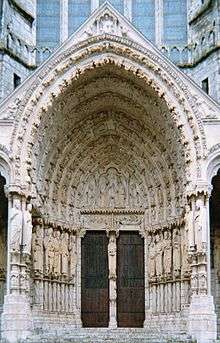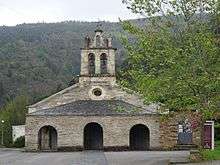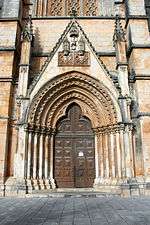portal
English

Portal of Chartres Cathedral
Etymology
From Medieval Latin portale, from porta.
Pronunciation
Noun
portal (plural portals)
- An entrance, entry point, or means of entry.
- The local library, a portal of knowledge.
- (Internet) A website or page that acts as an entrance to other websites or pages on the Internet.
- The new medical portal has dozens of topical categories containing links to hundreds of sites.
- (anatomy) A short vein that carries blood into the liver.
- (fiction) A magical or technological doorway leading to another location, period in time or dimension.
- (architecture) A lesser gate, where there are two of different dimensions.
- (architecture) Formerly, a small square corner in a room separated from the rest of an apartment by wainscoting, forming a short passage to another apartment.
- A grandiose and often lavish entrance.
- Milton
- Thick with sparkling orient gems / The portal shone.
- Milton
- (bridge-building) The space, at one end, between opposite trusses when these are terminated by inclined braces.
- A prayer book or breviary; a portass.
Hyponyms
- (elevated corridor permitting access to a plane from an airport): See jet bridge
Derived terms
Translations
grandiose entrance
|
entry point
website
vein
|
- The translations below need to be checked and inserted above into the appropriate translation tables, removing any numbers. Numbers do not necessarily match those in definitions. See instructions at Wiktionary:Entry layout#Translations.
Translations to be checked
|
Adjective
portal (not comparable)
Derived terms
Further reading

Catalan
Galician
.jpg)
Portal of the Church of Saint James, A Coruña

Church of Vilaboa, A Pontenova
Etymology
From Old Galician and Old Portuguese portal (13th century, Cantigas de Santa Maria), from Medieval Latin portalis, from Latin porta (“gate”).
Pronunciation
- IPA(key): /poɾˈtal/
Noun
portal m (plural portais)
- portal
- 1395, M. González Garcés (ed.), Historia de La Coruña. Edad Media. A Coruña: Caixa Galicia, page 555:
- seendo o Conçello da dicta vila da Crunna ajuntado por pregon en o portal da iglesia de Santiago da dicta vila. segundo que an de huso et de costume
- being the Council of the aforementioned town of A Coruña reunited by announcement at the portal of the church of Saint James of the mentioned town, as they have as customary usage
- seendo o Conçello da dicta vila da Crunna ajuntado por pregon en o portal da iglesia de Santiago da dicta vila. segundo que an de huso et de costume
- Synonym: pórtico
- 1395, M. González Garcés (ed.), Historia de La Coruña. Edad Media. A Coruña: Caixa Galicia, page 555:
- porch, portico
- 1390, M. L. Méndez Fernández (ed.), Contribución ó estudio dun libro das Tenzas da Catedral de Santiago. Edición crítica e estudio dos folios 1 a 27. , Universidade de Santiago de Compostela, page 64:
- que façades ẽna dita cassa dous portaes cõ súas portas et alpénderes contra a rrúa do Çiqueello
- you must build at that house two porches, with their doors and their roofs, on the Sequelo street
- que façades ẽna dita cassa dous portaes cõ súas portas et alpénderes contra a rrúa do Çiqueello
- 1390, M. L. Méndez Fernández (ed.), Contribución ó estudio dun libro das Tenzas da Catedral de Santiago. Edición crítica e estudio dos folios 1 a 27. , Universidade de Santiago de Compostela, page 64:
- gate
- Synonym: cancela
- hall
References
- “portal” in Dicionario de Dicionarios do galego medieval, SLI - ILGA 2006-2012.
- “portal” in Xavier Varela Barreiro & Xavier Gómez Guinovart: Corpus Xelmírez - Corpus lingüístico da Galicia medieval. SLI / Grupo TALG / ILG, 2006-2016.
- “portal” in Dicionario de Dicionarios da lingua galega, SLI - ILGA 2006-2013.
- “portal” in Tesouro informatizado da lingua galega. Santiago: ILG.
- “portal” in Álvarez, Rosario (coord.): Tesouro do léxico patrimonial galego e portugués, Santiago de Compostela: Instituto da Lingua Galega.
Middle French
Etymology
References
- Godefroy, Frédéric, Dictionnaire de l'ancienne langue française et de tous ses dialectes du IXe au XVe siècle (1881) (portal)
Occitan
Alternative forms
- portau (Gascon, Provençal, Limousin, Auvernhat, Vivaro-Alpine)
Pronunciation
- IPA(key): /puɾˈtal/
Old French
Alternative forms
Noun
portal m (oblique plural portaus or portax or portals, nominative singular portaus or portax or portals, nominative plural portal)
- gate (doorlike structure usually outside of a building or property)
References
- Godefroy, Frédéric, Dictionnaire de l'ancienne langue française et de tous ses dialectes du IXe au XVe siècle (1881) (portal)
Polish
Pronunciation
- IPA(key): /ˈpɔr.tal/
audio (file)
Declension
declension of portal
declension of portal
Portuguese

portal
Serbo-Croatian
Pronunciation
- IPA(key): /pǒrtaːl/
Spanish
Pronunciation
- IPA(key): /porˈtal/, [porˈt̪al]
- Hyphenation: por‧tal
See also
This article is issued from
Wiktionary.
The text is licensed under Creative
Commons - Attribution - Sharealike.
Additional terms may apply for the media files.